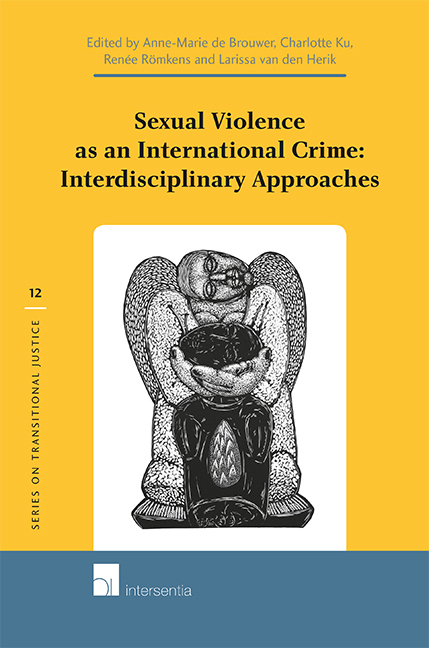Book contents
- Frontmatter
- Acknowledgements
- Foreword
- Contents
- Abbreviations
- INTRODUCTION
- PART 1 OVERVIEW OF SEVERAL MILESTONES AND CHALLENGES CONCERNING INTERNATIONAL CRIMINAL PROSECUTION OF SEXUAL VIOLENCE
- A HISTORICAL PERSPECTIVE, THE WAY FORWARD AND MILESTONES LONG OVERLOOKED
- THE INTERNATIONAL TRIBUNALS AND COURTS
- PART 2 SOCIAL, ARCHIVAL AND MEDICAL DATA COLLECTION AND ITS USE FOR THE CRIMINAL LAW PROCESS: METHODOLOGY ISSUES
- PART 3 SURVIVING SEXUAL VIOLENCE, STORY TELLING AND CREATING AWARENESS
- CONCLUDING REMARKS
- About the Contributors
Chapter 14 - Partners for Gender Justice
Published online by Cambridge University Press: 16 December 2020
- Frontmatter
- Acknowledgements
- Foreword
- Contents
- Abbreviations
- INTRODUCTION
- PART 1 OVERVIEW OF SEVERAL MILESTONES AND CHALLENGES CONCERNING INTERNATIONAL CRIMINAL PROSECUTION OF SEXUAL VIOLENCE
- A HISTORICAL PERSPECTIVE, THE WAY FORWARD AND MILESTONES LONG OVERLOOKED
- THE INTERNATIONAL TRIBUNALS AND COURTS
- PART 2 SOCIAL, ARCHIVAL AND MEDICAL DATA COLLECTION AND ITS USE FOR THE CRIMINAL LAW PROCESS: METHODOLOGY ISSUES
- PART 3 SURVIVING SEXUAL VIOLENCE, STORY TELLING AND CREATING AWARENESS
- CONCLUDING REMARKS
- About the Contributors
Summary
INTRODUCTION
Throughout history, women's rights organisations and advocates have been instrumental in every social change and justice initiative. They have influenced international conventions, provoked ground-breaking jurisprudence and driven legal reform. Non-governmental organisations (NGOs) led by women have also created global movements, adapted communication tools and established innovative services. Although sometimes invisible, women have often been at the forefront of democratic and political liberation struggles, anti-war and peace movements, and national emancipation efforts.
These initiatives continue with women advocates leading strategies to shape international gender justice and the work of the International Criminal Court (ICC), the only permanent Court with the potential to try individuals anywhere in the world for war crimes, crimes against humanity and genocide.
On 17 July 1998, the Rome Statute was adopted by 120 States and opened for signatories. The Statute came into force on 1 July 2002 upon receipt of sixty ratifications at which time the Court's jurisdiction became active. Since then it has established itself as a 698 person institution with 18 elected Judges, an independent Office of the Prosecutor, and Registry with oversight of the administrative and operational functions of the Court. The ICC includes a feature unique in international criminal justice, which is the Trust Fund for Victims mandated to provide rehabilitation assistance and reparations to victims and their families.
The key elements, which eventually gave rise to the ICC, have their roots in:
– Past conflicts and two world wars
– Previous efforts towards accountability and deterrence for grievous crimes and
– The voices of victims, civil society and in particular women's NGOs, who have shown themselves to be significant partners in the pursuit of accountability and peace.
Advocates for gender justice are asserting a stake in the process of designing a new international justice system, one that effectively prevents and addresses gender-based crimes and other forms of brutality most pervasive in conflict situations as well as developing a cohesive peace and security framework capable of deterring armed conflict itself.
It has been clearly documented that the commission of rape and other forms of sexual violence intensify and increase in both scale and brutality during violent civil unrest and armed conflicts.
- Type
- Chapter
- Information
- Publisher: IntersentiaPrint publication year: 2013
- 2
- Cited by



